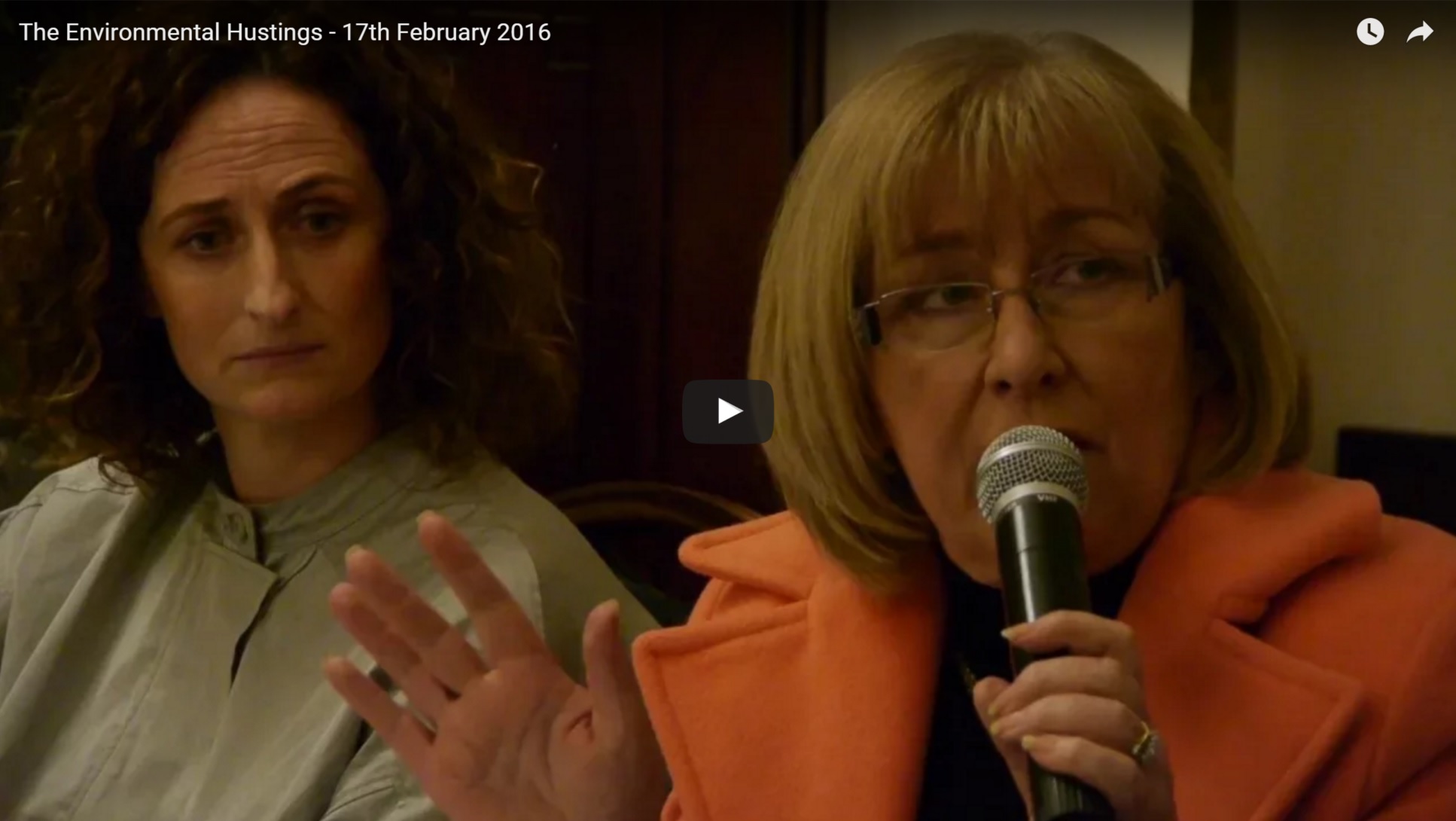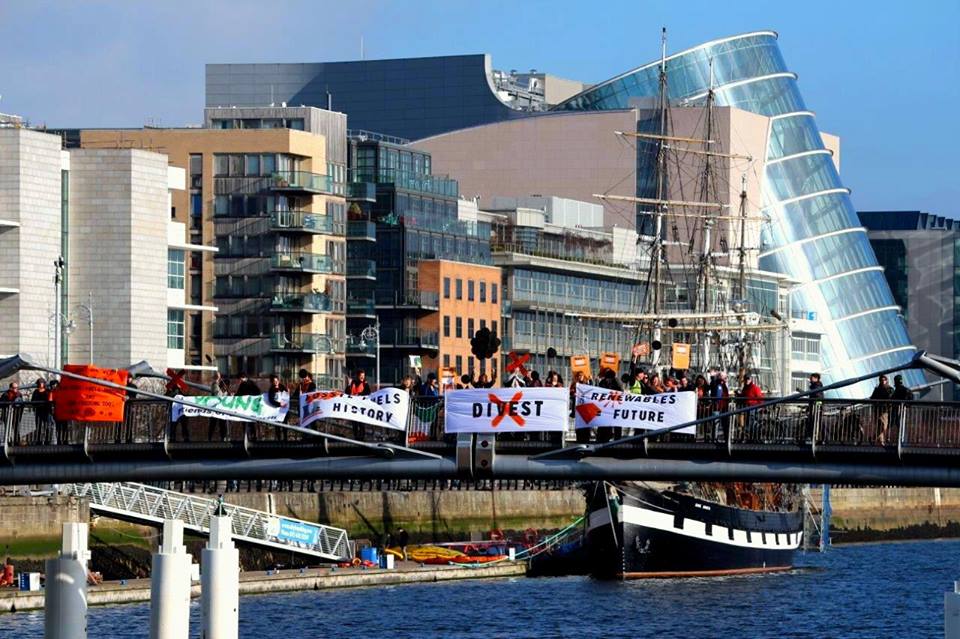Cllr Lorna Bogue on the Just Transition Greens

3 August 2020
Recently, a new green-left organisation, the Just Transition Greens, took shape and started to accumulate a following.
As an affiliate group of the Green Party, it’s open to both members and non-members and in their founding announcement, the signatories stressed that there is a need for the party to be, “more engaging with members and more active as a party in the area of social justice”.
We wanted to find out more about the group itself, so we rang up their interim co-chair, Lorna Bogue last week. We delved into its conceptualisation, what policy with a Just Transition in mind would look like, and into her thoughts of staying in the Green Party.
This conversation has been edited for clarity and length.
How would you define a Just Transition?
I’ve been thinking about that for quite a while. I did a masters in economic analysis and I was really impressed with the work of Elinor Ostrom, the only female winner for the Nobel prize of economics.
She talks about an organising structure that is very much grassroots based and focused on how people would normally organise themselves if capitalism wasn’t interfering. It’s the idea that people are best placed to make their own decisions and that’s the more ecologically sound and non-centralised way to organise society. That’s what really got me more into the Just Transition way of thinking.
We have to reach a zero carbon society, and I personally think we should be aiming to do that by 2030, but 2050 seems to be the timeframe that most people put on it. We have to reach that. There’s no two ways about it because if we don’t, the planet becomes uninhabitable for human life.
And we have to do it in a way that empowers people to live their own lives and live out their own ambitions and talents. I think that they should have all the things that they need in order to thrive, not just survive.
You wouldn’t think that’s a difficult or radical thing to ask for, but apparently, in Irish politics, it is.
I’ve also been really impressed with Kate Reyworth’s work on doughnut economics and my political practice at the moment is shaped around how we build a society that gives people the things that they need. That’s the basis of the society that we build on.
That means everyone having a warm and safe home, having good, locally produced food, being able to access healthcare and as much education as you want to have, having enough leisure time to have a creative life, to name just a few.
At the end of the day, this is what every politician should be asking for and doing it in such a way that you can provide these things within all the boundaries of the planet.
The answers are there, it’s just that the political will does not exist at the moment to do it, and unfortunately the Green Party is quite happy at the moment to mess around the edges. They’re still banging on about incremental changes, but they’re going to fail.
What are three Just Transition-focused climate action proposals you would put forward if you were in the Dail?
One of the first ones would be workers’ rights.
It’s been proven that company’s that have workers on the board tend to behave in a more sustainable way and that strong union representation in the workplace tends to see reduced carbon emissions. It’s also about ways of working, too.
Ireland works some of the longest hours in Europe, but hours worked and productivity are not in fact linked with each other, so I’d look at something like a four-day working week. I think that would do a lot to bring down carbon emissions.
The second thing I would do would have all public land being entirely used for public housing. Selling off or giving away public land to private developers doesn’t make sense from a Just Transition perspective.
The incentive for private developers is to increase and maximize private profit, so of course they’re not going to produce housing that is particularly efficient. Also, they’re not going to produce housing that people can actually live in.
Developers have been allowed to have their way for so long and planning regulations are so lax in this country that we actually have a housing stock that is extremely degraded. So people have to heat their houses using fossil fuels.
You can’t exactly come along, as the Green Party is planning to do in this Programme for Government, and say, “well you’re using solid fuels to be able to heat your home, we’re now going to put an additional carbon tax on you. Also, you have no means of actually changing the heating system in your house without incurring great expense and we’re not going to help you with that.” It’s just inherently unjust and unfair.
A third thing I would do is ensure that farmers get paid for the work that they do.
In terms of how we actually move agriculture towards lower carbon emissions, we can do that by paying people a decent wage. You have these highly intensive practices like beef production that are releasing methane, but on the other hand, you have beef farmers that earn about €8000 a year for doing that. There’s very few small farmers who can actually even do it full time anymore.
Unlike every other worker in the country, farmers get constantly told, and what the policy of the state has always been is, “produce more and get less money for it”.
As an economist, and I’m not an agriculture expert and I’d never pretend to be, but if you’re looking at simple supply and demand, the more that you produce, the faster you hit the demand for it. Once you go past the demand for it, the price of the good you’re producing starts to reduce, and it reduces a lot.
We have this funny idea of farmers where they’re this folkloric type of figure and the backbone of the country, but unfortunately for all of this respect that they get from the political establishment, they’re not getting a lot of help or getting good working conditions.
So rather than venerating farmers while also not helping them, I think we should be doing things like completely changing how we do farming in this country. We should be doing it on the basis that the person who’s doing the work on the farm, the farmer and their family, are getting a decent wage for a decent hour’s work.
And I think if we reconceptualized farmers as workers, then I think we could actually do something really good for rural communities in Ireland. I’m from the countryside myself, and that’s something that has to happen.
If these proposals were put forward, what are some challenges these Just Transition measures might face?
I think the main challenge we’d be facing at the moment is within the party, because there is a little bit of a culture of denial emerging within the Green Party internally.
The last few weeks have been quite difficult as a Green Party member. I’ve been really struggling with it, in terms of maybe I should go.
I’ve been saying from the start of this process, that I think that not only will we not get our climate goals achieved, but I actually feel that we will do more harm than good in this particular Programme for Government.
And it’s tiring to say I told you so all the time, and no one actually wants to listen to someone who says that, because it’s just not a particularly constructive thing to do.
But I think even for all of my fairly low expectations that this would end up causing harm, my expectations have in some sense been surpassed because of just how badly it’s gone these first three weeks.
It’s gone terribly. It’s just been awful. Atrocious. I’m really breaking out the thesaurus for adjectives that mean bad. Because as far as I can see, the Green Party is caving.
We’re failing in our remit, we’re failing in what we said we would do, and they’ve just been so weak there and without backbone.
I suppose we are challenging the party’s perception of itself. That is a difficult thing to do, especially when we are so insitutionalised as a party to believe we’re all very nice people and progressive, and that we’d never do anything to hurt working class people. But the reality is we’ve already done things to hurt working class people in government.
When you try and present that truth to people, of course they don’t want to hear it. They then become extremely defensive as a result of it. That will be the challenge to policy ideas that we’ll be bringing forward.
But I think that happens quite a lot in environmentalist movements. There’s a certain herd mentality, which is not a derogatory thing to say. I think all people exist in institutions and herds, and organise in social manners.
At some point you do need to take a bit of criticism. You do need to introspect on things that you are maybe failing at, and maybe you’ve created a space that is less than welcome for different groups or people who are different to you.
If you were to leave the party as you’ve mentioned before, would you stay in the Just Transition Greens as it’s open to members and non-members?
I have to reask myself that question every day because new things are happening, and there might be something that breaks this particular camel’s back. But for the time being, I’m okay with staying in the party.
Why?
Because I’m an openly critical party member, people will take the things I say as having more weight. Because if I left the party, it would be very difficult for me to continue talking about it without it seeming like I’m just annoyed about something else.
While the party is in government, I do feel almost a duty to hold them to account. If I wasn’t having an effect, I possibly would have left. But from what I can see and the reactions that I’m getting, it would appear that I am having an effect.
I suppose the party still has to engage with me while I remain a party member. I’m more about having an ongoing discussion and debate with them than simply saying my piece and then leaving. That’s not to cast judgement on what anyone else has done. I totally understand why someone would leave the party, and I still do think about it quite a bit.
From my own perspective, my life would be much easier and almost certainly a lot happier if I was no longer in the Green Party, and everyone who has left has spoken of this great sense of relief they have upon leaving the party. In it of itself, that’s a pretty damning indictment of any organisation.
What is the argument you tell yourself for staying?
That’s kindof different every day too. The argument I tell myself is the Green Party is in government now. If I was to leave and other people like me were to leave, then they could just continue to tell themselves that they’re great and socially conscious. There’s an excuse for everything and it’s exactly the same attitude that exists within the party about the previous time in government.
I came into politics to make change. If staying in the party is still something that enables me to make change on behalf of my constituents, then I’ll tough it out and I’ll keep doing it.
So I’m sorry if I’m not going to stay quiet or have an easy life or get appointed to well paid positions because I make people uncomfortable. That’s where we all are at the moment, and it has to be done. So that’s usually what I end up telling myself.







